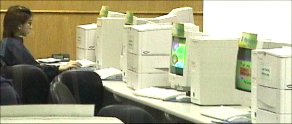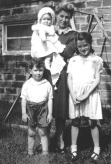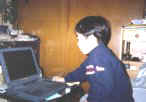The Academy: rationale and theory
|
| |
rationale
theory
|
The Axe Handle Academy is a proposal for a kind of
education that we think would make sense in this world, not the world
of the 50's and 60's, a kind of education that we could bring about in
Alaska over a period of a few years because it builds on ideas and
practices that some teachers and schools are already using now, a kind
of education that would genuinely give our children a sense of
confidence and ability in facing the unknown world they will meet upon
graduation.
|

|
It is safe to say that no one can predict what kind
of world our children will graduate into from high school. In three generations the world has experienced greater and more
widespread shocks of change than at any time in the past. The
cultural and technological gulf between our parents and our children is
greater than the gulf of thousands of years between Socrates or
Confucius and our parents.
As we see this gulf widening each day we parents and
teachers ask ourselves:
What is an appropriate education for our
children?
How can we prepare them for a world that is unknown to
all of us?
|
| |
|
|

|
|
In the four decades since World War II we have tried
to compensate for the pace of change by making many incremental
adjustments in our curriculum. We have continued to add items to
the curriculum in order to keep up with the times. But, of
course, with each item added something had to be dropped because our
days and hours are limited. Education in America has become a
collage of confetti. It is a confusing aggregate of so many
separate pieces that it does not add up to a coherent picture.
|
When one of our parents entered kindergarten a good
education was thought to be knowing the classics, the ability to read
and write at least one classical language, the ability to write clear
prose, the ability to give a good, clear and persuasive public speech,
and conscientious citizenship. The technology in the home and
the school was very little different from the technology in the homes
and schools of Socrates, Pythagoras and Confucius.
|
By the time the older one of us entered kindergarten
the world had gone through one world war and was entering the
second. His home and school had hot and cold water, electricity,
central heating, radios, and movies. While he was in elementary
school he saw his first jet plane overhead. In junior high
school he first saw television. The year he graduated from high
school Sputnik I first orbited the earth.
|
| |

|
In school he had read parts of some classics, he had
dropped Latin and gotten away with it, he was still expected to write
clear prose, but there was no public speaking taught, and good
citizenship had been transformed by World War II into patriotism first
and then by the Korean War into a deep fear of others.
|
|

|
|
By the time our children began kindergarten
micro-computers were part of daily life, the majority of children in
our country were spending more time watching television than attending
school, the classics and classical languages were no longer a part of
schooling, children were expected to be able to fill in blanks in
worksheets and multiple choice tests, and multinational corporations
had become more significant political and economic entities than all
but a few nations of the earth.
|
| |
|
We wrote the section above seventeen years
ago. The internet was not yet a factor in public,
commercial, or educational life. The word 'globalization'
was used only in very narrow circles. Now we feel a
major factor in educational and family practice is what we
have called 'The
Second Sphere'. The internet, cell phones, and other
new media technologies throughout the world have opened
up a sphere of social and intellectual development for
children and youth which lies almost entirely outside of the
monitoring or even understanding of most parents and
educational institutions.
We feel that current family and educational
practice has all but capitulated its traditional role of
socializing and educating children and that in a perhaps
dangerous way, that role has been taken over by international
corporate marketing and entertaining interests.
|
|
| |
|
| |
|
| |
|
| |
the academy
the curriculum
quiz
life of the land
comparative culture
studies
responsive
communication
history
publications
links
copyright
xxxxxxxxxxxxxxxxxxxxxxxx
|